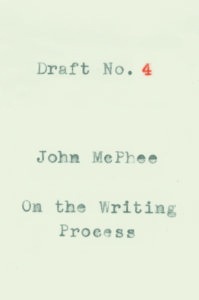 “Hunt through your mind for a good beginning. Then write it. Write a lead.” There, I found it …
“Hunt through your mind for a good beginning. Then write it. Write a lead.” There, I found it …
As a semi-intoxicated reader of most of John McPhee’s 32 books, I launched into these eight mesmerizing essays on the art (and work) of writing as soon as they were published late last year. McPhee, a Princeton graduate (1953), a lecturer and writing advisor at the University, and a long-time contributor to The New Yorker, dissects the challenging process of converting ideas to understandable prose with erudition, clarity, and, above all, good humor.
The key is to write …
“Young writers find out what kinds of writers they are by experiment … Put words to paper as frequently as you can. Keep thinking.
McPhee states, “Whatever you do, don’t rely on memory.” How true! When I wrote an autobiography some years ago, I found my old letters, calendars, and notes all too often corrected an errant memory. As McPhee notes, “Writing is selection” and “Factual writing is also a kind of treasure hunt,” looking for nuggets through piles of old papers, adding, “Writing is a matter strictly of developing oneself. You compete only with yourself. You develop yourself by writing.”
Other astute observations McPhee makes on the writing process are:
- the “considerable tension between chronology and theme … chronology usually dominates.”
- “ … a basic criterion for all structures: they should not be imposed on the material. They should arise from within.”
- “The approach to structure in factual writing is like returning from a grocery store with materials you intend to cook for dinner. You set them out on the kitchen counter and what’s there is what you deal with, and all you deal with.”
- Finally, “the essence of the process is revision.” Hence at least draft #4!
One suggestion hit me personally: “The title is an integral part of writing, and one of the most important parts, and ought not to be written by anyone but the writer of what follows the title.” All three of the books I’ve written began with a title in mind.
But the title of one of my books, Mumpsimus Revisited, was so confusing to a possible publisher that I had to self-publish that one. It referred to the importance of being able to change your mind when you should. It came from a European story of a medieval monk who used the word “mumpsimus” in his reading of the Eucharist, rather than the correct “sumpsimus.” He refused to change. My book began with an acknowledgement that, when I found myself in error, I quickly made the correction! But I refused to alter my title!
McPhee gives us an entertaining, thoroughly enjoyable, and knowledgeable guide to not only writing but also everything we read.
Try it … and keep writing!
Editor’s Note: ‘Draft No. 4: On the Writing Process’ by John McPhee was published by Farrar, Straus and Giroux, New York, 2017.

Felix Kloman
About the Author: Felix Kloman is a sailor, rower, husband, father, grandfather, retired management consultant and, above all, a curious reader and writer. He’s explored how we as human beings and organizations respond to ever-present uncertainty in two books, ‘Mumpsimus Revisited’ (2005) and ‘The Fantods of Risk’ (2008). A 20-year resident of Lyme, he now writes book reviews, mostly of non-fiction that explores our minds, our behavior, our politics and our history. But he does throw in a novel here and there. For more than 50 years, he’s put together the 17 syllables that comprise haiku, the traditional Japanese poetry, and now serves as the self-appointed “poet laureate” of Ashlawn Farm Coffee, where he may be seen on Friday mornings. His wife, Ann, is also a writer, but of mystery novels, all of which begin in a village in midcoast Maine, strangely reminiscent of the town she and her husband visit every summer.